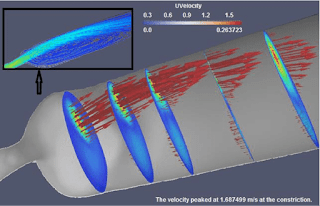Cellular functions related to the maintenance of homoeostasis are regulated by shear forces sensed by endothelial cells. The endothelial cells sense local changes in shear stress. The resulting signals are either transduced into chemical responses or transmitted to the surroundings to regulate the cellular activity.
In the current literature, models of blood flow applied to the characterization of atherosclerotic plaques consider blood as a Newtonian fluid because of the characteristic length of the domain. At predilection sites for plaque deposition, the diameter of the blood particles is much smaller than the normal arterial diameter. However, under disease condition, the proportions can dramatically change due to a reduction greater than 80% in the arterial cross-section, in cases of severe stenosis. Here we show that in diseased arteries, the local particle concentration can peak at locations associated to high inflammation.

No comments:
Post a Comment